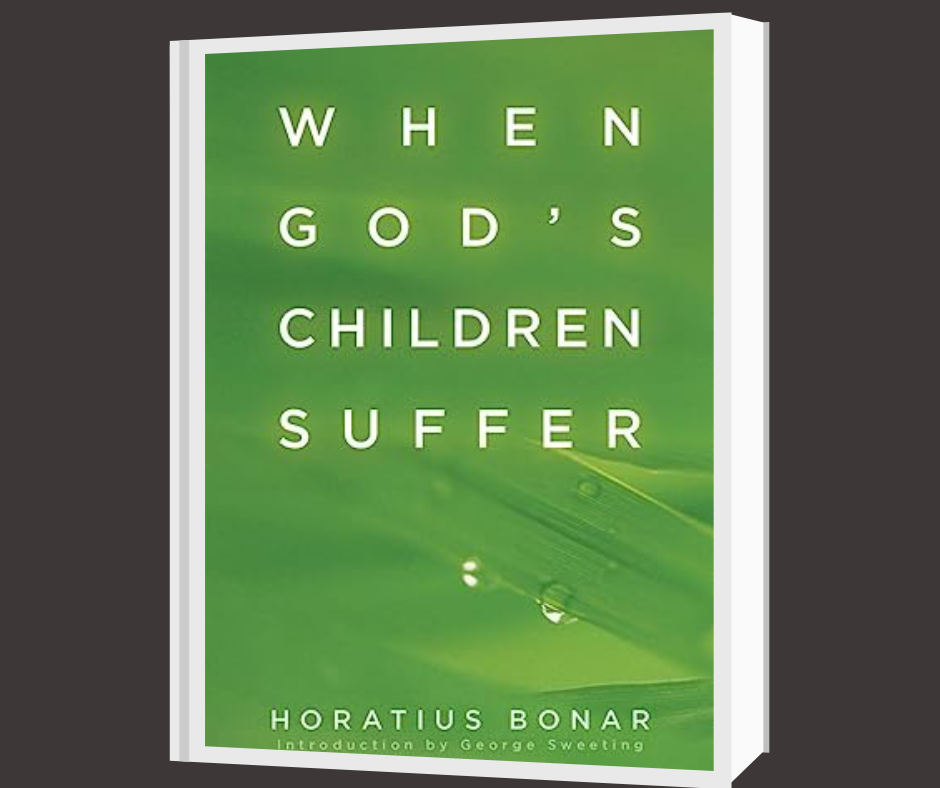Book Reviews
When God’s Children Suffer, by Horatius Bonar | Review by Rosa Byler

The Christian book market has experienced an outpouring of good instructive material in the last few years, due at least in part to such endeavors as the Christian school and home-school movements and the growing interest in biblical counseling. In our enjoyment of the new, let us not forget the old books that qualify as timeless Christian classics! When God’s Children Suffer, by Horatius Bonar, is one of these. Since its original publication in 1845, the book has been reprinted a number of times, indicating its value to generations of Christians.
Horatius Bonar was an active and powerful Scottish preacher and writer of the 1800s. (Most of us would recognize him as the author of a number of well-known hymns; during his lifetime, more people were familiar with his books and tracts.) Potential readers may fear that an outdated style will make the book heavy reading; it is not. There are the usual words whose meanings have shifted over the course of time, but Bonar’s writing style is simple and his sentences short. However, the book’s weighty content and frequent quotes from or allusions to Scripture make it one you will not hurry through.
As the title of the book implies, it is not a general treatise on the problem of suffering but a specific help for those in God’s family who are currently experiencing His chastening. A bit of reflection will bring us to the realization that at some time or other, that will be anyone who names the name of Christ--put inelegantly and ungrammatically, that will be us! Bonar takes time to define the “family of God” before proving from Heb. 12 that affliction is their badge and discipline their lifelong preparation for glory.
“Discipline” is not a word we linger over. Its connotations are generally negative. Bonar brings out four aspects of God’s discipline that present the word in an entirely positive light; the one that most impressed me was the thought of God’s infinite power to bring about the results He intends. His treatment “cannot miscarry or be frustrated (38).” Comparing it to child-training done perfectly, Bonar shows God’s object as training not just the will, but also the heart, mind, and conscience. He distinguishes between the rod with which God smites the wicked and what he terms “family rods,” in which there is no condemnation.
A short chapter on biblical images for suffering precedes a list of eight effects or achievements of the discipline of the Lord, each the subject of a chapter. In describing the purposes for each of these, Bonar isolates more examples of unhealthy living and wrong perspectives than most of us have ever thought of. I suspect it will be a rare Christian who does not recognize himself in a variety of unflattering postures. As Bonar comments, “There are no beings about whom we make so many mistakes as our own selves (59).”The final chapter outlines the “eternal results” of suffering, more poetic than precise and more a collection of quotes from Scripture than speculations on heaven.
During his lifetime, Bonar was thought by some to be excessively dour and sober. The chapter on the “solemnizing” effect of chastening will give this impression, as evinced by the opening line: “Laughter and gaiety belong to a fallen world (85).” Living well over a hundred years ago, Bonar could not have imagined the social media upon which we lightheartedly twitter away; yet he describes so aptly what often occurs there as to seem prophetic. Before concluding that Bonar’s position was due merely to an overly grave temperament, perhaps we should consider the effect our customs of communication have had on us. Another small bone on which you might choke is the author’s readiness to attribute every little difficulty to the chastening hand of God (suggesting that if you do not respond to the slight cold, the trivial aggravation, or the minor mishap, stronger methods will be on the way). In spite of this, the book is well worth your while. Whether or not you are currently experiencing suffering, this book will instruct and minister to you personally. It is a perspective-shaper no church library should be without.